2024年中考英语动词的时态小结:一般现在时&现在进行时&一般过去时一般将来时学案(含答案)
文档属性
| 名称 | 2024年中考英语动词的时态小结:一般现在时&现在进行时&一般过去时一般将来时学案(含答案) |
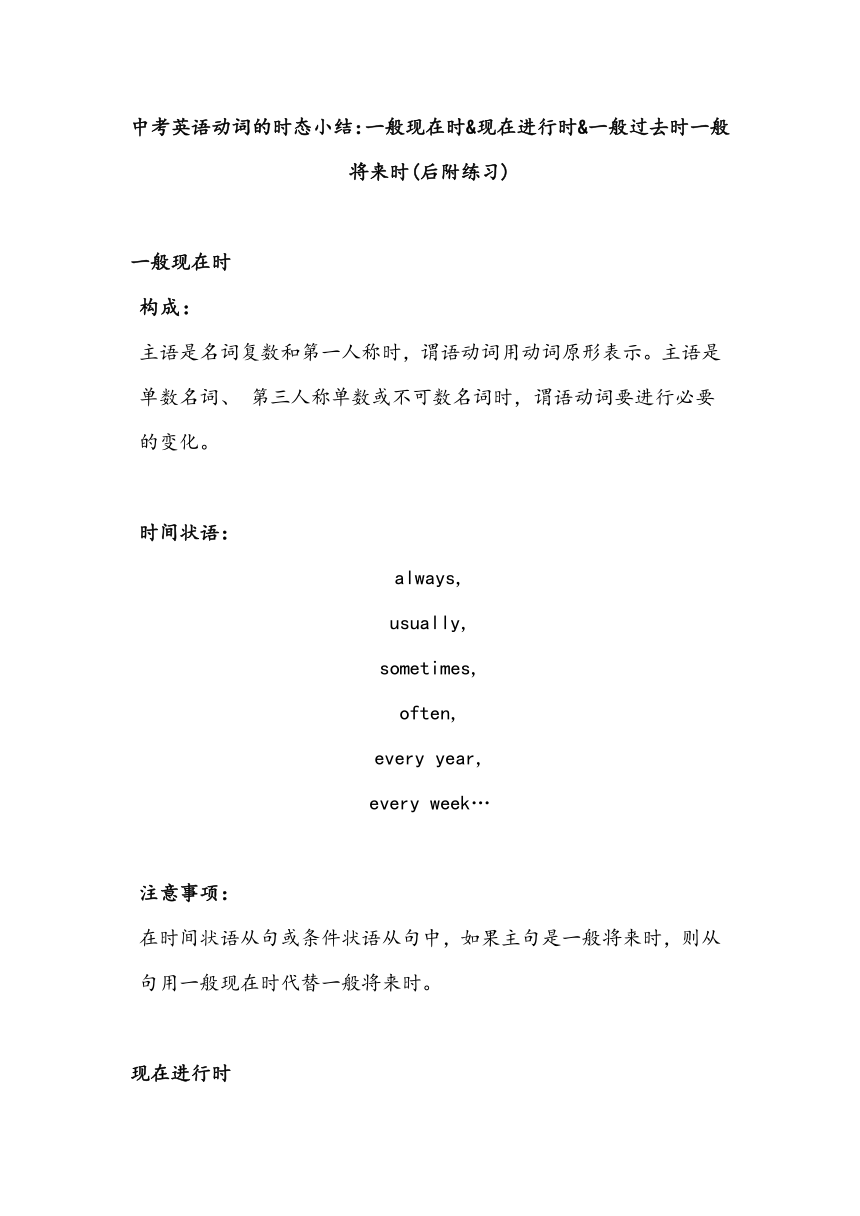
|
|
| 格式 | docx | ||
| 文件大小 | 22.5KB | ||
| 资源类型 | 教案 | ||
| 版本资源 | 人教新目标(Go for it)版 | ||
| 科目 | 英语 | ||
| 更新时间 | 2024-05-11 00:00:00 | ||
图片预览

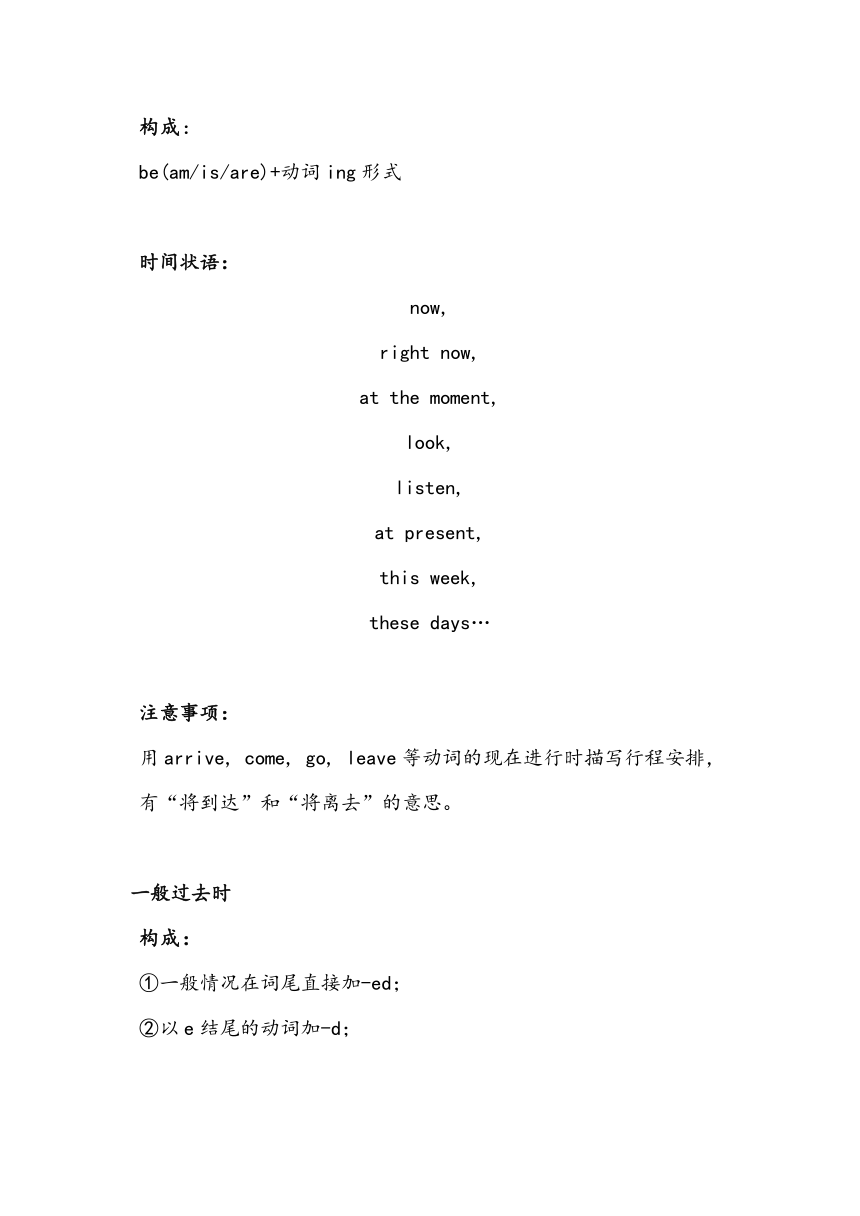
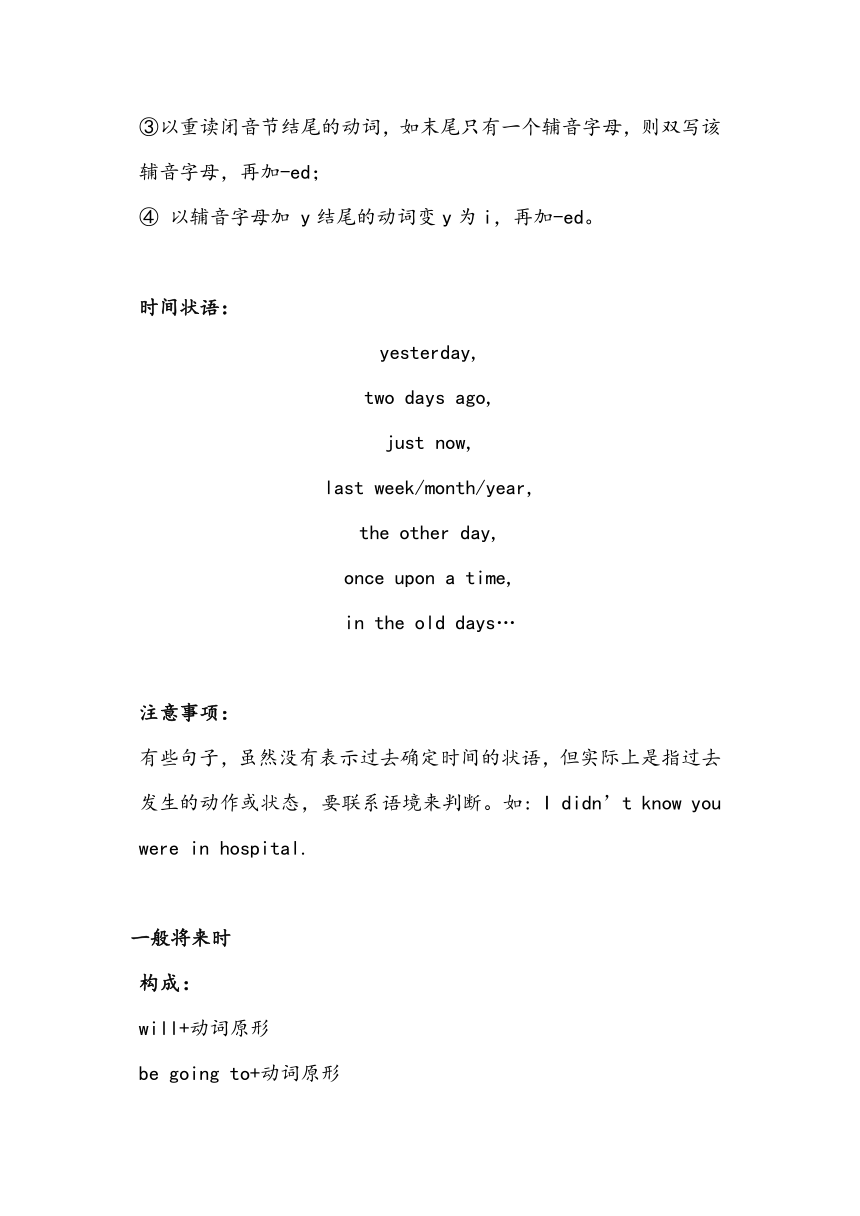
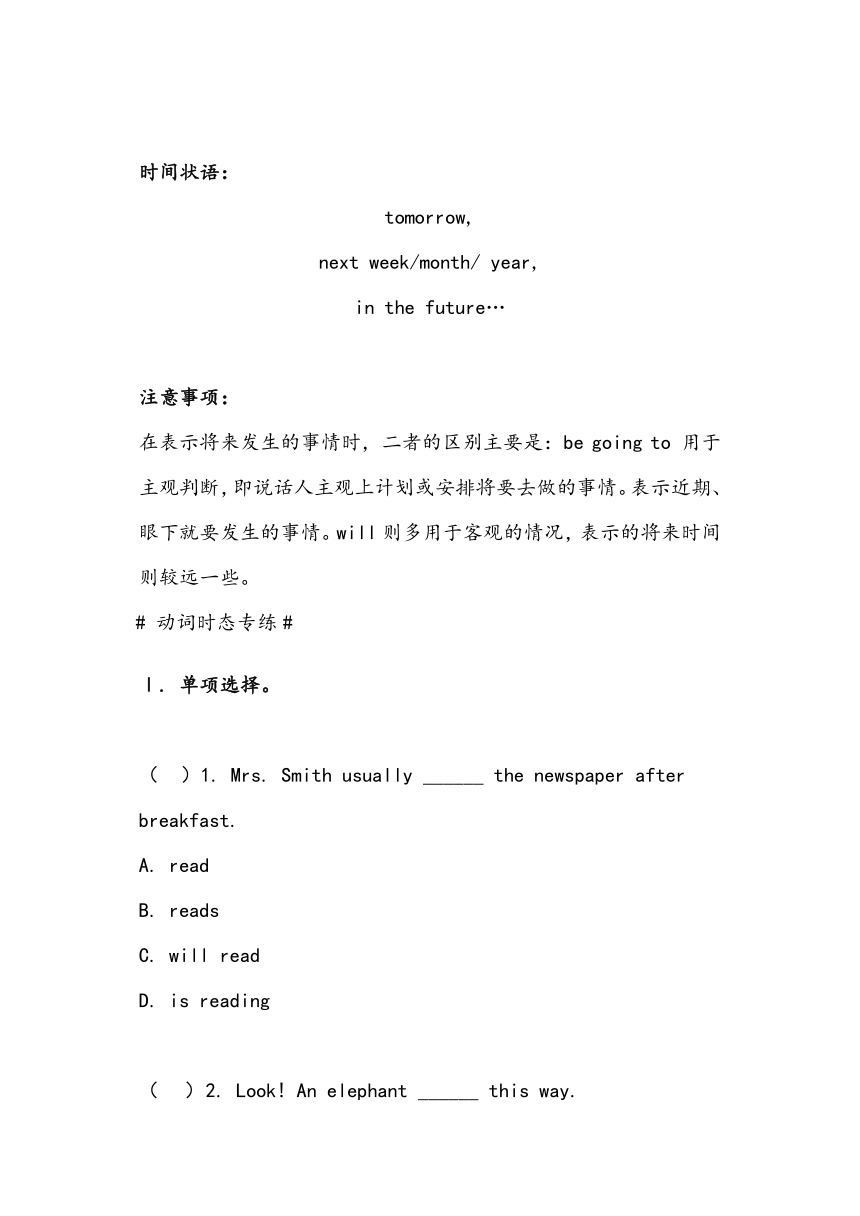
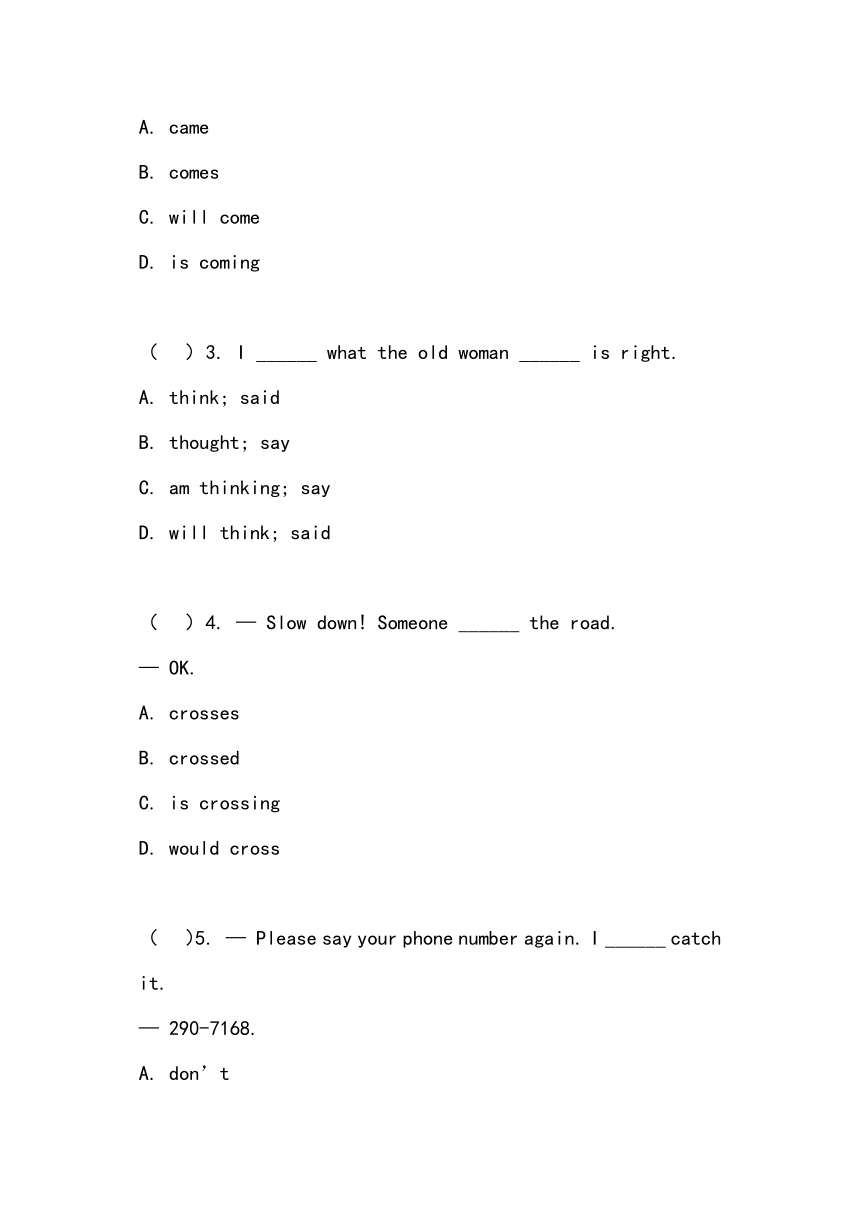
文档简介
中考英语动词的时态小结:一般现在时&现在进行时&一般过去时一般将来时(后附练习)
一般现在时
构成:
主语是名词复数和第一人称时,谓语动词用动词原形表示。主语是单数名词、 第三人称单数或不可数名词时,谓语动词要进行必要的变化。
时间状语:
always,
usually,
sometimes,
often,
every year,
every week…
注意事项:
在时间状语从句或条件状语从句中,如果主句是一般将来时,则从句用一般现在时代替一般将来时。
现在进行时
构成:
be(am/is/are)+动词ing形式
时间状语:
now,
right now,
at the moment,
look,
listen,
at present,
this week,
these days…
注意事项:
用arrive, come, go, leave等动词的现在进行时描写行程安排,有“将到达”和“将离去”的意思。
一般过去时
构成:
①一般情况在词尾直接加-ed;
②以e结尾的动词加-d;
③以重读闭音节结尾的动词,如末尾只有一个辅音字母,则双写该辅音字母,再加-ed;
④ 以辅音字母加 y结尾的动词变y为i,再加-ed。
时间状语:
yesterday,
two days ago,
just now,
last week/month/year,
the other day,
once upon a time,
in the old days…
注意事项:
有些句子,虽然没有表示过去确定时间的状语,但实际上是指过去发生的动作或状态,要联系语境来判断。如: I didn’t know you were in hospital.
一般将来时
构成:
will+动词原形
be going to+动词原形
时间状语:
tomorrow,
next week/month/ year,
in the future…
注意事项:
在表示将来发生的事情时,二者的区别主要是:be going to 用于主观判断,即说话人主观上计划或安排将要去做的事情。表示近期、眼下就要发生的事情。will则多用于客观的情况,表示的将来时间则较远一些。
# 动词时态专练 #
Ⅰ. 单项选择。
( )1. Mrs. Smith usually ______ the newspaper after breakfast.
A. read
B. reads
C. will read
D. is reading
( )2. Look! An elephant ______ this way.
A. came
B. comes
C. will come
D. is coming
( )3. I ______ what the old woman ______ is right.
A. think; said
B. thought; say
C. am thinking; say
D. will think; said
( )4. — Slow down! Someone ______ the road.
— OK.
A. crosses
B. crossed
C. is crossing
D. would cross
( )5. — Please say your phone number again. I ______ catch it.
— 290-7168.
A. don’t
B. didn’t
C. won’t
D. wouldn’t
( )6. There ______ a lion show in the zoo tomorrow morning.
A. has
B. will have
C. is going to have
D. is going to be
( )7. Come home early, or your parents ______ about you.
A. will worry
B. to worry
C. worried
D. worry
( )8. Grandma is making soup in the kitchen. How nice it ______!
A. smelt
B. smells
C. will smell
D. is smelling
( )9. — What’s Alex doing right now
— He ______ soccer. He ______ soccer every Saturday on the playground.
A. plays; playing
B. plays; will play
C. is playing; plays
D. is playing; played
( )10. Please remember to turn off the lights when you ______.
A. left
B. leave
C. will leave
D. is leaving
Ⅱ. 用括号内所给动词的适当形式填空。
1. The story ________ (happen) on a rainy morning.
2. People ________ (travel) by the flying car in 100 years.
3. The earth ________ (move) around the sun.
4. It’s nine o’clock. Dale ________ (work) in the office now.
5. — Who sings best in your class
— Alice ________ (do).
6. I often ________ (swim) in the river when I ________ (be) a child.
7. If Bob ________ (stay) away from junk food, he ________ (be) in good health.
8. They ________ (visit) the Great Wall next winter holiday.
9. Be quiet! The baby ________ (sleep).
10. I ________ (write) to you when I ________ (get) to London.
Ⅲ. 按要求完成句子。每空一词。
1. Last Friday, we picked apples on the farm. (改为否定句)
Last Friday, we ________ ________ apples on the farm.
2. Anna usually goes to an old people’s home on weekends. (用一般过去时改写句子)
Anna ________ ________ an old people’s home last weekend.
3. Sally is enjoying bright sunshine on the beach. (用一般现在时改写句子)
Sally often ________ bright sunshine on the beach.
4. David will buy a beautiful hatfor his daughter’s birthday. (对画线部分提问)
________ ________ David ________ for his daughter’s birthday
5. My dad washes his car twice a month. (改为一般疑问句并作肯定回答)
—________ your dad ________ his car twice a month
— Yes, ________ ________.
Ⅳ. 根据汉语意思完成句子。每空一词。
1. 明天下午有一场篮球比赛。
There ________ ________ ________ ________ a basketball match tomorrow afternoon.
2. 看看天上的云,要下雨了。
Look at the clouds in the sky. It ________ ________ ________ rain.
3. 杰克不是在写作业,他是在画画。
Jack ________ ________ his homework. He ________ ________ pictures.
4. 动身前往伦敦前,我会完成所有的工作。
I will finish all my work before I ________ ________ London.
5. 约翰刚刚坐在沙发上和他的朋友们聊天。
John ________ on the sofa and ________ with his friends just now.
Ⅴ. 用括号内所给动词的适当形式完成短文。
Dear Sara,
How are you I (1) ________ (get) your e-mail last week. Thanks for the recipe(食谱) for the cake. I (2) ________ (make) the cake yesterday and it was very nice.
Now I want to tell you something about my life. I (3) ________ (have) a new job in a supermarket last week. I (4) ________ (go) there every day at 3 o’clock in the afternoon and work there until 7 o’clock in the evening. I’m very happy because my sister (5) ________ (work) there too. So we travel to and from work together. My brother (6) ________ (come) to stay with me for a few days next week. He (7) ________ (arrive) on Saturday and I’m going to pick him up at the train station. After that, we (8) ________ (visit) the city park. Would you like to come with us Tell me if you (9) ________ (want) to join us.
I’m (10) ________ (look) forward to your reply.
All the best,
Eric
答案:
Ⅰ.1-5 BDACB 6-10 DABCB
Ⅱ.1. happened 2. will travel 3. moves 4. is working 5. does 6. swam; was 7. stays; will be 8. will visit 9. is sleeping 10. will write; get
Ⅲ.1. didn’t pick 2. went to 3. enjoys 4. What will; buy 5. Does; wash; he does
Ⅳ.1. is going to be 2. is going to 3. isn’t doing; is drawing 4. leave for 5. sat; talked
Ⅴ.1. got 2. made 3. had 4. go 5. works 6. is going to come / will come 7. is going to arrive / will arrive 8. will visit / are going to visit 9. want 10. looking
一般现在时
构成:
主语是名词复数和第一人称时,谓语动词用动词原形表示。主语是单数名词、 第三人称单数或不可数名词时,谓语动词要进行必要的变化。
时间状语:
always,
usually,
sometimes,
often,
every year,
every week…
注意事项:
在时间状语从句或条件状语从句中,如果主句是一般将来时,则从句用一般现在时代替一般将来时。
现在进行时
构成:
be(am/is/are)+动词ing形式
时间状语:
now,
right now,
at the moment,
look,
listen,
at present,
this week,
these days…
注意事项:
用arrive, come, go, leave等动词的现在进行时描写行程安排,有“将到达”和“将离去”的意思。
一般过去时
构成:
①一般情况在词尾直接加-ed;
②以e结尾的动词加-d;
③以重读闭音节结尾的动词,如末尾只有一个辅音字母,则双写该辅音字母,再加-ed;
④ 以辅音字母加 y结尾的动词变y为i,再加-ed。
时间状语:
yesterday,
two days ago,
just now,
last week/month/year,
the other day,
once upon a time,
in the old days…
注意事项:
有些句子,虽然没有表示过去确定时间的状语,但实际上是指过去发生的动作或状态,要联系语境来判断。如: I didn’t know you were in hospital.
一般将来时
构成:
will+动词原形
be going to+动词原形
时间状语:
tomorrow,
next week/month/ year,
in the future…
注意事项:
在表示将来发生的事情时,二者的区别主要是:be going to 用于主观判断,即说话人主观上计划或安排将要去做的事情。表示近期、眼下就要发生的事情。will则多用于客观的情况,表示的将来时间则较远一些。
# 动词时态专练 #
Ⅰ. 单项选择。
( )1. Mrs. Smith usually ______ the newspaper after breakfast.
A. read
B. reads
C. will read
D. is reading
( )2. Look! An elephant ______ this way.
A. came
B. comes
C. will come
D. is coming
( )3. I ______ what the old woman ______ is right.
A. think; said
B. thought; say
C. am thinking; say
D. will think; said
( )4. — Slow down! Someone ______ the road.
— OK.
A. crosses
B. crossed
C. is crossing
D. would cross
( )5. — Please say your phone number again. I ______ catch it.
— 290-7168.
A. don’t
B. didn’t
C. won’t
D. wouldn’t
( )6. There ______ a lion show in the zoo tomorrow morning.
A. has
B. will have
C. is going to have
D. is going to be
( )7. Come home early, or your parents ______ about you.
A. will worry
B. to worry
C. worried
D. worry
( )8. Grandma is making soup in the kitchen. How nice it ______!
A. smelt
B. smells
C. will smell
D. is smelling
( )9. — What’s Alex doing right now
— He ______ soccer. He ______ soccer every Saturday on the playground.
A. plays; playing
B. plays; will play
C. is playing; plays
D. is playing; played
( )10. Please remember to turn off the lights when you ______.
A. left
B. leave
C. will leave
D. is leaving
Ⅱ. 用括号内所给动词的适当形式填空。
1. The story ________ (happen) on a rainy morning.
2. People ________ (travel) by the flying car in 100 years.
3. The earth ________ (move) around the sun.
4. It’s nine o’clock. Dale ________ (work) in the office now.
5. — Who sings best in your class
— Alice ________ (do).
6. I often ________ (swim) in the river when I ________ (be) a child.
7. If Bob ________ (stay) away from junk food, he ________ (be) in good health.
8. They ________ (visit) the Great Wall next winter holiday.
9. Be quiet! The baby ________ (sleep).
10. I ________ (write) to you when I ________ (get) to London.
Ⅲ. 按要求完成句子。每空一词。
1. Last Friday, we picked apples on the farm. (改为否定句)
Last Friday, we ________ ________ apples on the farm.
2. Anna usually goes to an old people’s home on weekends. (用一般过去时改写句子)
Anna ________ ________ an old people’s home last weekend.
3. Sally is enjoying bright sunshine on the beach. (用一般现在时改写句子)
Sally often ________ bright sunshine on the beach.
4. David will buy a beautiful hatfor his daughter’s birthday. (对画线部分提问)
________ ________ David ________ for his daughter’s birthday
5. My dad washes his car twice a month. (改为一般疑问句并作肯定回答)
—________ your dad ________ his car twice a month
— Yes, ________ ________.
Ⅳ. 根据汉语意思完成句子。每空一词。
1. 明天下午有一场篮球比赛。
There ________ ________ ________ ________ a basketball match tomorrow afternoon.
2. 看看天上的云,要下雨了。
Look at the clouds in the sky. It ________ ________ ________ rain.
3. 杰克不是在写作业,他是在画画。
Jack ________ ________ his homework. He ________ ________ pictures.
4. 动身前往伦敦前,我会完成所有的工作。
I will finish all my work before I ________ ________ London.
5. 约翰刚刚坐在沙发上和他的朋友们聊天。
John ________ on the sofa and ________ with his friends just now.
Ⅴ. 用括号内所给动词的适当形式完成短文。
Dear Sara,
How are you I (1) ________ (get) your e-mail last week. Thanks for the recipe(食谱) for the cake. I (2) ________ (make) the cake yesterday and it was very nice.
Now I want to tell you something about my life. I (3) ________ (have) a new job in a supermarket last week. I (4) ________ (go) there every day at 3 o’clock in the afternoon and work there until 7 o’clock in the evening. I’m very happy because my sister (5) ________ (work) there too. So we travel to and from work together. My brother (6) ________ (come) to stay with me for a few days next week. He (7) ________ (arrive) on Saturday and I’m going to pick him up at the train station. After that, we (8) ________ (visit) the city park. Would you like to come with us Tell me if you (9) ________ (want) to join us.
I’m (10) ________ (look) forward to your reply.
All the best,
Eric
答案:
Ⅰ.1-5 BDACB 6-10 DABCB
Ⅱ.1. happened 2. will travel 3. moves 4. is working 5. does 6. swam; was 7. stays; will be 8. will visit 9. is sleeping 10. will write; get
Ⅲ.1. didn’t pick 2. went to 3. enjoys 4. What will; buy 5. Does; wash; he does
Ⅳ.1. is going to be 2. is going to 3. isn’t doing; is drawing 4. leave for 5. sat; talked
Ⅴ.1. got 2. made 3. had 4. go 5. works 6. is going to come / will come 7. is going to arrive / will arrive 8. will visit / are going to visit 9. want 10. looking
同课章节目录
- 词法
- 名词
- 动词和动词短语
- 动词语态
- 动词时态
- 助动词和情态动词
- 非谓语动词
- 冠词
- 代词
- 数词和量词
- 形容词副词及其比较等级
- 介词和介词短语
- 连词和感叹词
- 构词法
- 相似、相近词比较
- 句法
- 陈述句
- 一般疑问句和否定疑问句
- 特殊疑问句及选择疑问句
- 反意疑问句
- 存在句(There be句型)
- 宾语从句
- 定语从句
- 状语从句
- 主谓一致问题
- 简单句
- 并列句
- 复合句
- 主谓一致
- 主、表语从句
- 名词性从句
- 直接引语和间接引语
- 虚拟语气
- 感叹句
- 强调句
- 倒装句
- 祈使句
- 句子的成分
- 句子的分类
- 题型专区
- 单项选择部分
- 易错题
- 完形填空
- 阅读理解
- 词汇练习
- 听说训练
- 句型转换
- 补全对话
- 短文改错
- 翻译
- 书面表达
- 任务型阅读
- 语法填空
- 其他资料
